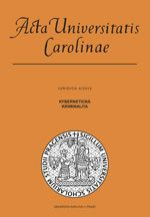Občanství národních států a Evropské unie – filozofické základy a vývoj
Citizenship of National States and the European Union – Philosophical Basis and Development
Author(s): Petr MlsnaSubject(s): Law, Constitution, Jurisprudence
Published by: Univerzita Karlova v Praze, Nakladatelství Karolinum
Keywords: citizenship; persons without citizenship; European Citizens’ Initiative; fundamental human rights and freedoms; European union; globalization
Summary/Abstract: This article deals with an issue of citizenship as a basic constitutional and cultural element, which is defined by the relationship between a citizen and the state. Today the concept of citizenship is undergoing significant transformation associated with the globalization of the economy and society and citizenship is losing its identifying role. Consequently, extreme examples of this development are persons without citizenship, who are not bound by any obligations to the state, but they are not under the protection of any state. This position of desperate persons without citizenship in many cases reflects the limited nature of the doctrine of fundamental human rights and freedoms. The second part of the article deals with the current development of the idea of European Citizens’ Initiative, which aims to allow Europeans to identify themselves more with the development of the European Union as an area of regions.
Journal: Acta Universitatis Carolinae Iuridica
- Issue Year: 60/2014
- Issue No: 2
- Page Range: 83-93
- Page Count: 11
- Language: Czech

